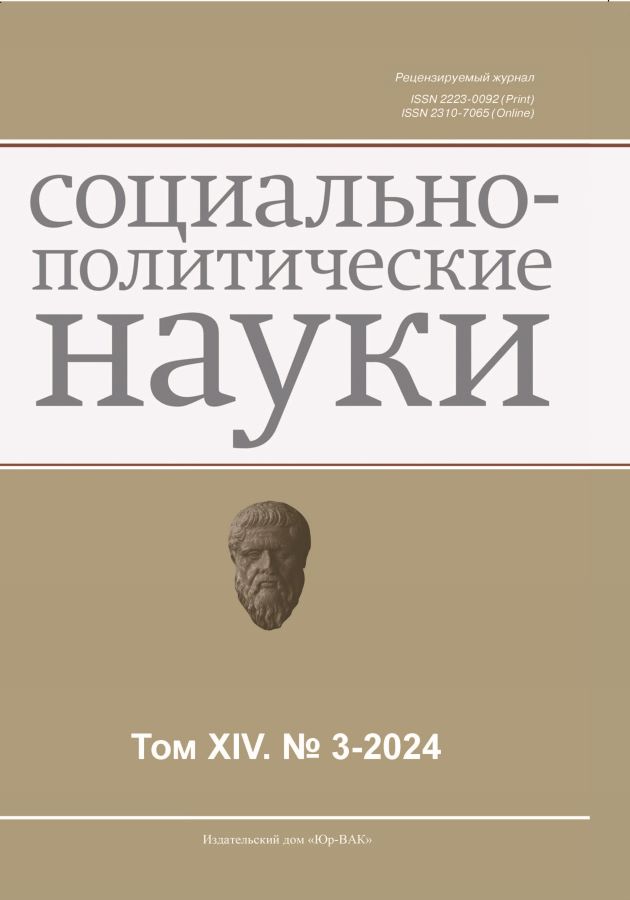Social transformation in Russia in the 1990s: problems and periodization of the formation of social policy
- Авторлар: Yusupov R.G.1, Khaibullin A.R.1, Grigoriev E.N.1
-
Мекемелер:
- Ufa University of Science and Technology
- Шығарылым: Том 14, № 3 (2024)
- Беттер: 45-50
- Бөлім: Russian Public Administration: Pages of History and Modernity
- URL: https://journals.eco-vector.com/2223-0092/article/view/635466
- DOI: https://doi.org/10.33693/2223-0092-2024-14-3-45-50
- EDN: https://elibrary.ru/IMXDVP
- ID: 635466
Дәйексөз келтіру
Аннотация
The article analyzes the problems and periodization of the formation of social policy in Russia in the 1990s. After the collapse of the USSR, the abandonment of the socialist path of development and a sharp turn towards the capitalist path, expressed in radical market reforms, the Russian state, which began to copy and transfer the experience of developed Western countries to Russian realities, faced a dual task – to form an economic policy based on market principles and, again based on the experience of Western countries, a new social policy. Western states are not unanimous on social issues, but social policies are formed and implemented by all. There are three basic models of it, in which the participation of the state in the implementation of social tasks is outlined in different ways. However, the Russian authorities are faced not so much with the problem of choosing an appropriate model, but with the problem of adapting the state’s social obligations to the consequences of market transformations. The term “transformational model of social policy” even appeared in the scientific literature, indicating a state of transition, but it was not possible to unambiguously describe this term, since approaches to social transformation in different countries did not repeat each other. Moreover, the practice of transition to a market in Russia and other countries with a socialist background has shown different reactions to universal market laws and mechanisms. The Russian scenario turned out to be painful for the economy and social sphere. It was established that the social sphere was transformed in three stages, but none of them had a systematic and complete form. On this basis, we concluded that in Russia in the 1990s, social transformation laid some of the foundations for social policy. But it did not lead to the formation of social policy itself, which is incorrect to interpret as a certain sum of social measures, because any policy, including social policy, is usually understood as a mechanism developed by the state for regulating social relations, aimed at their harmonization.
Негізгі сөздер
Толық мәтін
Авторлар туралы
Rakhimyan Yusupov
Ufa University of Science and Technology
Хат алмасуға жауапты Автор.
Email: yusupovr.g@yandex.ru
SPIN-код: 9034-2690
Dr. Sci. (Hist.); Professor, Department of Theory of State and Law, Institute of Law
Ресей, UfaAinur Khaibullin
Ufa University of Science and Technology
Email: arnauka@bk.ru
SPIN-код: 3436-2643
Cand. Sci. (Law), Associate Professor; associate professor, Department of Theory of State and Law, Institute of Law
Ресей, UfaEvgeniy Grigoriev
Ufa University of Science and Technology
Email: gevgeniyn@mail.ru
SPIN-код: 4269-1836
PhD in Pedagogy, Associate Professor; associate professor, Department of Pedagogy
Ресей, UfaӘдебиет тізімі
- Abazov A.A., Yusupov R.G. Global trends in the legal regulation of economic relations. Bulletin of the Institute of Law of the Bashkir State University. 2022. No. 4. Pp. 7–20. (In Rus.)
- Amantaev I.R., Yusupov R.G. On the interpretation of some legal terms of the social sphere. Bulletin of the Institute of Law of Bashkir State University. 2023. No. 2. Pp. 66–78. (In Rus.)
- Danilova E.N. Periods of change in social policy and ideas about social justice. Sociological Science and Social Practice. 2015. No. 2 (10). Pp. 18–50. (In Rus.)
- Klimenko V.A. Social market economy: genesis and principles of formation and development. Economic Science Today. 2017. No. 5. Pp. 445–464. (In Rus.)
- Kormshchikov D.A. What model of social policy is Russia striving for? Bulletin of Nizhny Novgorod University named after N.I. Lobachevsky. 2014. No. 1. Pp. 439–444. (In Rus.)
- Lukshin O.V. Social state: Concept, development and implementation of the idea. In: Law: Modern trends: Materials of the VI International. scientific conf. Krasnodar: Novation, 2018. Pp. 2–6.
- Maleva T.M., Grishina E.E., Tsatsura E.A. Social policy in the long term: Multidimensional poverty and effective targeting. Moscow: RANEPA, 2019. 52 p.
- Ramazanov Zh.Sh. Socio-economic model of China and lessons for Russia. News of Tomsk Polytechnic University. 2009. Vol. 314. No. 6. Pp. 13–15. (In Rus.)
- Sonin O.V. Social development of the CIS states: problems and solutions. Russia and the Modern World. 2012. No. 1. Pp. 203–215. (In Rus.)
- Shakhbanov A.M. Features of state social policy in the 90s XX century. Theory and Practice of Social Development. 2012. No. 11. Pp. 184–187. (In Rus.)
Қосымша файлдар








